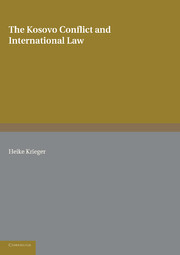Book contents
- Frontmatter
- Contents
- Map
- Preface
- Chronology
- Introduction
- Chapter 1 Kosovo's Status in Yugoslavia before 1999
- Chapter 2 Development of the Human Rights Situation pages 14 to 40
- Chapter 2 Development of the Human Rights Situation pages 41 to 64
- Chapter 2 Development of the Human Rights Situation pages 65 to 90
- Chapter 2 Development of the Human Rights Situation pages 90 to 114
- Chapter 3 Diplomatic Efforts for the Settlement of the Crisis pages 115 to 146
- Chapter 3 Diplomatic Efforts for the Settlement of the Crisis pages 147 to 187
- Chapter 3 Diplomatic Efforts for the Settlement of the Crisis pages 187 to 217
- Chapter 3 Diplomatic Efforts for the Settlement of the Crisis pages 218 to 253
- Chapter 3 Diplomatic Efforts for the Settlement of the Crisis pages 253 to 286
- Chapter 4 Military Action against Yugoslavia pages 287 to 313
- Chapter 4 Military Action against Yugoslavia pages 314 to 352
- Chapter 5 Settlement of the Crisis
- Chapter 6 Statement by NATO Memeber States
- Chapter 7 International Reactions to the Crisis pages 424 to 460
- Chapter 7 International Reactions to the Crisis pages 461 to 499
- Chapter 8 Court Action with regard to the Kosovo Crisis
- Chapter 9 Implementation of the Principles for a Political Solution of the Conflict
- Chronological List of Documents
- Select Bibliography
- Index
Chapter 8 - Court Action with regard to the Kosovo Crisis
Published online by Cambridge University Press: 05 July 2014
- Frontmatter
- Contents
- Map
- Preface
- Chronology
- Introduction
- Chapter 1 Kosovo's Status in Yugoslavia before 1999
- Chapter 2 Development of the Human Rights Situation pages 14 to 40
- Chapter 2 Development of the Human Rights Situation pages 41 to 64
- Chapter 2 Development of the Human Rights Situation pages 65 to 90
- Chapter 2 Development of the Human Rights Situation pages 90 to 114
- Chapter 3 Diplomatic Efforts for the Settlement of the Crisis pages 115 to 146
- Chapter 3 Diplomatic Efforts for the Settlement of the Crisis pages 147 to 187
- Chapter 3 Diplomatic Efforts for the Settlement of the Crisis pages 187 to 217
- Chapter 3 Diplomatic Efforts for the Settlement of the Crisis pages 218 to 253
- Chapter 3 Diplomatic Efforts for the Settlement of the Crisis pages 253 to 286
- Chapter 4 Military Action against Yugoslavia pages 287 to 313
- Chapter 4 Military Action against Yugoslavia pages 314 to 352
- Chapter 5 Settlement of the Crisis
- Chapter 6 Statement by NATO Memeber States
- Chapter 7 International Reactions to the Crisis pages 424 to 460
- Chapter 7 International Reactions to the Crisis pages 461 to 499
- Chapter 8 Court Action with regard to the Kosovo Crisis
- Chapter 9 Implementation of the Principles for a Political Solution of the Conflict
- Chronological List of Documents
- Select Bibliography
- Index
Summary
The International Court of Justice (ICJ)
On 28 April 1999, the FRY submitted a request for the indication of provisional measures against Belgium, Canada, France, Germany, Italy, the Netherlands, Portugal, Spain, the United Kingdom, and the United States of America (document no. 306). A day later the FRY submitted an application accusing these states that by taking part in the air strikes against the FRY, they had infringed upon their obligation not to use force and that by taking part in the training, arming, financing, equipping, and supplying of the KLA they had violated their obligation to non-intervention (document no. 307). In addition, the FRY raised claims concerning breaches of international humanitarian law, environmental law, basic human rights, freedom of navigation on international rivers, and allegations of genocide. Only four days before filing the application the FRY had accepted the compulsory jurisdiction of the International Court of Justice according to Art. 36 para. 2 of the ICJ-Statute.
Oral pleadings were held from 10 May 1999 to 12 May 1999 (document no. 308). By the order of 2 June 1999 (document no. 309), the Court rejected the request for the indication of provisional measures. The question of prima facie jurisdiction of the Court was decisive for the order. Depending on a legal obligations of the different respondent parties the ICJ examined various bases for jurisdiction: The question of reservations ratione temporis according to Art.
- Type
- Chapter
- Information
- The Kosovo Conflict and International LawAn Analytical Documentation 1974–1999, pp. 500 - 530Publisher: Cambridge University PressPrint publication year: 2001



